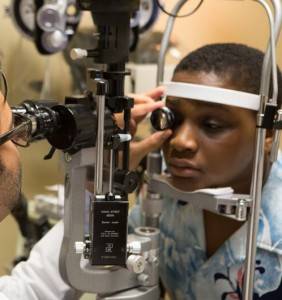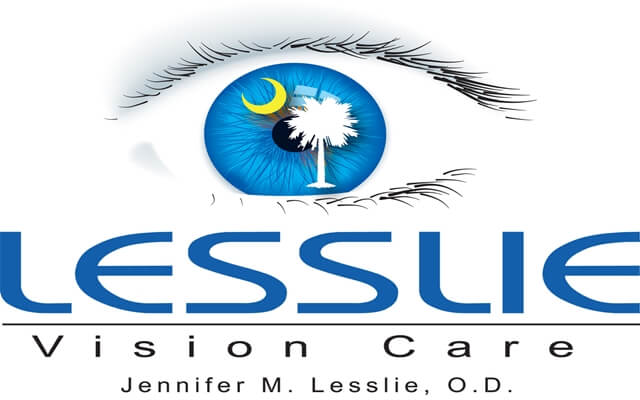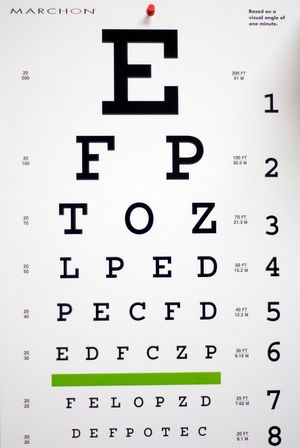The Best Eye Exam in North Charleston, SC
It's important to have regular eye exams regardless of your age or physical health.
During a comprehensive eye exam, your North Charleston eye doctor will determine your prescription for eyeglasses or contact lenses, and also check your eyes for commonplace eye diseases. Your North Charleston optometrists will also evaluate how your eyes work together, and assess your eyes as an indicator of your overall health.
Eye specialists suggest that you have a complete eye exam periodically, such as every one to three years, depending on your age, risk factors, and health.
 Children. Some eyecare experts estimate that approximately 5% to 10% of pre-schoolers and 25% of school-aged children have vision issues. According to the American Optometric Association (AOA), which makes recommendations regarding eye exams, all children should have their eyes examined at 6 months of age, at age 3 and again before the start of school. Children who have no vision issues or risk factors for eye problems should have their eyes checked at least every two years throughout their school years.
Children. Some eyecare experts estimate that approximately 5% to 10% of pre-schoolers and 25% of school-aged children have vision issues. According to the American Optometric Association (AOA), which makes recommendations regarding eye exams, all children should have their eyes examined at 6 months of age, at age 3 and again before the start of school. Children who have no vision issues or risk factors for eye problems should have their eyes checked at least every two years throughout their school years.
Children who have current vision problems or risk factors should have their eyes checked more often. Common risk factors for vision issues may include:
- premature birth
- developmental delays
- turned or crossed eyes
- family history of eye disease
- history of eye injury
- other physical illness or disease
It is recommended by the AOA that children who wear eyeglasses or contact lenses should have their eyes checked at least every 12 months or according to their doctor's instructions. Read more about Pediatric Eye Exams.
We asked Dr. Lesslie...
I am 40 and have never gotten my eyes examined. Why should I have it done if I am not having any trouble seeing things?
A thorough, dilated eye examination can give much insight into other systemic issues that can be occurring in other parts of the body. By having an eye examination, an optometrist can detect diabetes mellitus, high blood pressure, high cholesterol, autoimmune disorders, colon cancer and other cancers, and many other things that may have gone undetected. It is important to have a thorough eye exam to make sure your sight is not threatened even if your vision seems ok.
Why do I have to have my eyes dilated during an eye examination?
Dilation is a very important part of the eye exam, but does not necessarily have to be done yearly. It makes the pupil much larger allowing the clinician to look way out in the periphery of the eye. This is an area of the eye that can not be seen unless someone is dilated. The periphery is where holes and tears and things that can be sight threatening like to start. It is a good idea to have this done every other year or so. Unless there is a reason to do it more often.
What happens during dilation and am I going to be able to drive afterwards?
Dilation opens your pupil up to allow a wider viewing area to the back of the eye. The pupil remains dilated for around 3 hrs or sometimes a full day depending on the drop used, therefore sensitivity to light can be an issue. The drops also put the accommodative system to rest decreasing the ability to read things up close. Distance vision may be a little blurred but driving after ward is not a problem for most people. Our office provides fancy sunglasses to help with the uncomfortable side effects.

Adults. The AOA suggests that any adult who wears eyeglasses or contacts have an annual eye exam. If you don't generally require vision correction, you should still have an eye exam every two to three years up to the age of 40, depending on how quickly your vision is changing and overall health. Doctors often suggest examinations more frequently for adults with diabetes, high blood pressure and other disorders, as many diseases can have a negative impact on vision and eye health.
If you are over 40, you should have your eyes checked every one to two years to check for commonplace age-related eye problems such as presbyopia, cataracts and macular degeneration.
The risk of eye disease continues to increase as you get older, so everyone over the age of 60 should be examined yearly.


